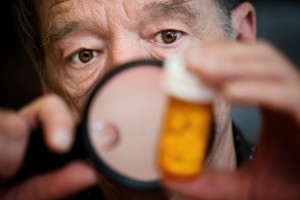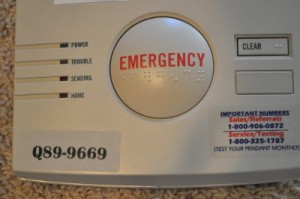Some Medications Found to Contribute to High Numbers of Senior Falls
 While medical science has led to longer life expectancy, there are drawbacks. One risk is the medications found to contribute to the high numbers of senior falls. While many seniors are on at least one medication, many older persons are on four, five or even more. These medications are important for treating various conditions and diseases, some can affect balance, increasing the risk of falls. Seniors who want to maintain good health and avoid falls should be aware of the side effects of every medication prescribed, drug interactions, and ask the doctor if there is a healthy alternative to the drug. As an example, many people have had impressive results in decreasing high blood pressure through diet.
While medical science has led to longer life expectancy, there are drawbacks. One risk is the medications found to contribute to the high numbers of senior falls. While many seniors are on at least one medication, many older persons are on four, five or even more. These medications are important for treating various conditions and diseases, some can affect balance, increasing the risk of falls. Seniors who want to maintain good health and avoid falls should be aware of the side effects of every medication prescribed, drug interactions, and ask the doctor if there is a healthy alternative to the drug. As an example, many people have had impressive results in decreasing high blood pressure through diet.
One of the Culprits in Senior Falls: Anti-Depressants
Anti-depression medications are prescribed at very high rates to the elderly in the USA. If you have been prescribed one of these drugs, be aware that they can greatly affect balance. Daytime drowsiness can lead to falls – and many anti-depressants have this side effect. SSRI (selective serotonin uptake inhibitors) have different effects on different people. Some people suffer a sleep disturbance with these drugs, leading to daytime drowsiness and a higher risk of falls. The AARP has reported a window of time when nursing home residents were at a higher risk of falls occurring during the first four days of a change to certain anti-depressants, including Effexor, Trazadone, Wellbutrin, and Remeron. While experts are unsure about why these drugs have this effect, if you have been prescribed one of these medications it is important to be particularly careful when walking or bathing during the first four days after the change. Other anti-depressants in the SSRI class (selective serotonin uptake inhibitors) have also been linked to higher numbers of falls.
Depression and the Elderly – Is Medication the Answer?
Depression is a complex problem and must be treated on an individual basis. If you often feel depressed, it is important that you have a physical so the source can be identified, such as a vitamin deficiency. Mild depression can happen to anyone, and seniors face many difficult issues, such as the death of friends and relatives, illnesses, conditions, and other age-related issues. Rather than turning to depression medications as the first step, it may be safer to try natural methods to improve mood, such as exercise, joining self-help groups, counseling, and changing your diet to include higher levels of protein and fresh, healthy fruits and vegetables. While it is always important to listen to speak to your doctor and seek treatment, many modern seniors are choosing natural, healthy methods to deal with feelings of depression. Take note that if you are on an anti-depressant and want to stop that you need to slowly wean off the medication rather than suddenly stop taking it. Talk to your doctor about the correct way to wean off depression medication so you do not suffer some of the serious side effects that can occur. Concerns about the increased fall risk associated with these medications is of concern.
Med Alert Systems for Fall Protection
Many active seniors choose a med alert system. These systems make it possible to get immediate medical help after a fall – which can be lifesaving. These med alert systems come with a wide range of features, and choosing the appropriate system for your lifestyle is easier than ever at Medical Alert Comparison. From basic home-based systems to highly advanced GPS-based systems, many features are available.
Many seniors from the Baby Boomer generation are looking for smart alternatives for various medications. Whether you choose to visit a nutritionist, naturopath, chiropractor, or another type of alternative medicine, ensuring you understand the side effects of any medication you take so you are aware of an increased fall risk is important to your overall health and safety.



